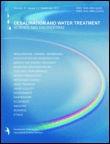
Desalination and Water Treatment
Scope & Guideline
Catalyzing Change in Water Resource Management
Introduction
Aims and Scopes
- Water Treatment Technologies:
Research and development of advanced water treatment methods, including adsorption, biological treatment, electrochemical processes, and membrane technologies. - Desalination Methods:
Innovations and improvements in desalination techniques, including reverse osmosis, multi-effect distillation, and hybrid desalination systems. - Pollutant Removal:
Studies focused on the removal of contaminants, including heavy metals, pharmaceuticals, and organic pollutants from water sources. - Sustainable Practices:
Exploration of sustainable and eco-friendly methods for water purification, including the use of natural coagulants and bioremediation techniques. - Water Quality Assessment:
Assessment of water quality through various indices, modeling, and monitoring techniques to ensure safe drinking water and environmental protection. - Wastewater Management:
Research on the treatment, reuse, and recycling of wastewater, including innovative approaches to minimize environmental impact. - Resource Recovery:
Studies aimed at recovering valuable resources from wastewater and brine, including nutrients and energy.
Trending and Emerging
- Nanomaterials in Water Treatment:
The use of nanomaterials, such as graphene oxide and metal nanoparticles, is increasingly prevalent for their superior adsorption and photocatalytic properties in pollutant removal. - Artificial Intelligence in Water Management:
The incorporation of AI and machine learning techniques for predictive modeling and optimization in water treatment processes is on the rise, showcasing a shift towards data-driven solutions. - Advanced Oxidation Processes (AOPs):
AOPs are gaining attention for their effectiveness in degrading persistent organic pollutants, with research focusing on the optimization and application of these methods in various water matrices. - Bioremediation and Eco-Friendly Approaches:
Research on utilizing biological agents and eco-friendly materials for wastewater treatment is trending, highlighting a move towards sustainable practices. - Integrated Water Management Systems:
Studies that focus on the integration of various treatment technologies and resource recovery systems are becoming more common, emphasizing holistic approaches to water sustainability. - Electrochemical Treatment Methods:
There is a growing interest in electrochemical methods for water treatment, particularly for removing contaminants and improving process efficiency.
Declining or Waning
- Conventional Coagulation Processes:
The traditional chemical coagulation methods are increasingly being overshadowed by more advanced and efficient techniques such as electrocoagulation and bio-coagulation, leading to a decline in publications focusing solely on conventional methods. - Basic Water Quality Parameters:
There seems to be a reduced emphasis on studies that only focus on basic water quality parameters without integrating advanced treatment methodologies or ecological impacts. - Low-Tech Solutions:
Research centered on low-tech or low-cost solutions is becoming less frequent as the journal emphasizes innovative, technology-driven approaches to water treatment.
Similar Journals

Tecnologia y Ciencias del Agua
Connecting research and practice in sustainable engineering.Tecnologia y Ciencias del Agua is a dynamic and innovative open access journal published by the Instituto Mexicano de Tecnología del Agua, dedicated to advancing knowledge in the fields of civil and structural engineering as well as water science and technology. Since its inception in 1930, the journal has provided a platform for interdisciplinary research and discussion, catering to an audience of researchers, professionals, and students interested in the management of water resources and sustainable engineering practices. With an ISSN of 0187-8336, and an E-ISSN of 2007-2422, this journal has converged its focus from 2010 through 2024, although it currently holds Q4 quartiles in its category as per the 2023 rankings, indicating its evolving role within the global landscape of academic publishing. Despite its emerging status, the journal's commitment to disseminating high-quality, peer-reviewed research on critical topics related to water management and engineering continues to enhance its relevance and appeal. The journal is based in Morelos, Mexico, contributing to the region's rich academic tradition while also engaging with a broader international audience through its extensive open access policy.
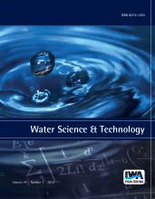
WATER SCIENCE AND TECHNOLOGY
Connecting knowledge and technology for sustainable water practices.WATER SCIENCE AND TECHNOLOGY, published by IWA PUBLISHING, is a leading academic journal dedicated to advancing the field of water science and technology. With a rich history dating back to 1970, the journal provides a platform for innovative research and technological advancements, catering to the vital challenges faced within the realms of environmental engineering and water resource management. As evidenced by its strong ranking in Scopus, where it holds a position of #86 in Water Science and Technology and #77 in Environmental Engineering, the journal exemplifies significant scholarly contributions, reflected in its Q2 quartile status in both categories as of 2023. Although not an open access journal, WATER SCIENCE AND TECHNOLOGY ensures that its articles are widely available to researchers, professionals, and students passionate about sustainable water solutions. With a continued commitment to excellence, this journal plays a crucial role in shaping the discourse surrounding water quality, conservation, and technology innovation, making it an essential resource for all stakeholders in this critical field.
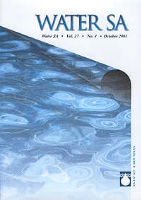
WATER SA
Connecting research and innovation in water management.WATER SA, published by the WATER RESEARCH COMMISSION, serves as a pivotal platform for interdisciplinary research in the areas of water science and technology. With an ISSN of 0378-4738 and an E-ISSN of 1816-7950, this open-access journal has been committed to disseminating knowledge since 2005, ensuring that research is freely accessible to a global audience. As of 2023, it holds a Q3 ranking in several key categories including Applied Microbiology and Biotechnology, Management, Monitoring, Policy and Law, Waste Management and Disposal, and Water Science and Technology. These rankings reflect its significant contribution to these disciplines, particularly in South Africa where it is based. With a history dating back to 1976 and converging research efforts extending through 2024, WATER SA aims to illuminate pressing water-related challenges and foster innovative solutions through rigorous scientific inquiry. Researchers, professionals, and students interested in the sustainability and management of water resources will find its comprehensive portfolio essential for advancing their work and understanding in an increasingly critical field.

Water
Championing high-quality research for a water-secure world.Water, an esteemed journal published by MDPI, serves as a pivotal resource for global research in the fields of aquatic science, biochemistry, geography, and water science and technology. Since its inception in 2009, this open-access journal has committed itself to advancing knowledge regarding water-related topics by fostering a platform that encourages the dissemination of high-quality research. With its impressive impact factor reflecting its relevance and influence, Water ranks in the top quartiles in various categories, including Q1 in Aquatic Science and Water Science and Technology, showcasing its commitment to publishing cutting-edge findings that resonate deeply with the environmental and biological sciences community. Located in Basel, Switzerland, the journal prioritizes accessibility for researchers, professionals, and students alike, aligning with the broader scientific goal of addressing urgent water challenges through collaborative and interdisciplinary research.

Water Quality Research Journal
Elevating discussions on critical water quality issues.Water Quality Research Journal, published by IWA PUBLISHING in the United Kingdom, is a vital resource for researchers and professionals in the field of water science and technology. With an ISSN of 2709-8044 and E-ISSN 2709-8052, this journal focuses on the critical examination and advancements in water quality issues, addressing both ecological and human health aspects. As a valued open-access journal, it ensures wide dissemination of research findings and encourages influential discussions among the global scientific community. Ranked in the Q2 category for Water Science and Technology and positioned at #98/261 in Scopus' Environmental Science rankings, the journal is dedicated to publishing high-impact research that fosters innovation and collaboration across various disciplines. By bridging the gap between fundamental research and practical applications, the Water Quality Research Journal plays a pivotal role in advancing our understanding and management of water quality challenges, making it an indispensable tool for academicians, policymakers, and industry leaders alike.

Water Conservation Science and Engineering
Fostering Collaboration for a Sustainable Water FutureWater Conservation Science and Engineering, published by SPRINGERNATURE, is a vital academic journal dedicated to advancing the fields of environmental engineering, ocean engineering, waste management, and water science and technology. Since its inception in 2016, the journal has quickly established itself within the academic community, achieving a commendable Q3 ranking across multiple categories in 2023. With an ISSN of 2366-3340 and an E-ISSN of 2364-5687, it is accessible to a global readership eager to explore the latest research and innovations in water conservation and sustainable practices. Although currently not open access, the journal is committed to publishing high-quality scholarly articles that provide insights into effective water management strategies, innovative engineering solutions, and the critical importance of preserving our water resources. Based in Singapore, Water Conservation Science and Engineering aims to foster interdisciplinary collaboration among researchers, professionals, and students, making it an essential resource for anyone passionate about environmental sustainability and preservation.
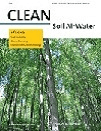
CLEAN-Soil Air Water
Empowering Global Knowledge in Environmental ScienceCLEAN-Soil Air Water, an esteemed journal published by Wiley, serves as a vital platform for disseminating research in the fields of environmental chemistry, pollution, and water science and technology. Operating under an Open Access model, it embraces the principles of knowledge sharing, making significant research findings readily accessible to a global audience. With an ISSN of 1863-0650 and an E-ISSN of 1863-0669, the journal has demonstrated its importance in the academic community, reflected in its Scopus rankings within the top quartiles of its categories. Established in 2007 and continuing through to 2024, CLEAN-Soil Air Water offers researchers, professionals, and students an opportunity to explore innovative studies that address pressing environmental challenges, facilitating an exchange of novel ideas and techniques essential for sustainable development. With a publication footprint in Germany and a growing international reputation, this journal is an invaluable resource for those dedicated to advancing the science and practices of environmental stewardship.
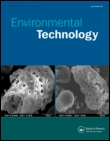
ENVIRONMENTAL TECHNOLOGY
Pioneering Research for a Sustainable FutureENVIRONMENTAL TECHNOLOGY, published by Taylor & Francis Ltd, is a prominent journal that serves as a crucial platform for disseminating pioneering research in the multifaceted fields of Environmental Science, Water Science and Technology, and Waste Management. With an impressive record spanning over three decades from 1990 to 2024, the journal holds significant rankings in various categories, including Q3 in Environmental Chemistry and Q2 in both Medicine (miscellaneous) and Water Science and Technology for 2023. Its Scopus rankings further position it within the top tiers of Environmental Science disciplines, reflecting its influence and relevance, particularly as it pertains to pressing global environmental challenges. While the journal does not offer an open access option, it remains dedicated to advancing knowledge and promoting innovative solutions among researchers, professionals, and students engaged in environmental studies. As it continues to attract high-quality submissions, ENVIRONMENTAL TECHNOLOGY plays a vital role in shaping future research and practices aimed at sustainable environmental management.

E-Water
Innovating Solutions for Sustainable Water ResourcesE-Water, published by the European Water Association, is a leading academic journal focused on the multifaceted field of water resource management and environmental sustainability. With the ISSN 1994-8549, this journal serves as a vital platform for researchers, professionals, and students dedicated to advancing knowledge in water science and related areas. Although currently not an Open Access journal, E-Water provides in-depth peer-reviewed articles, ensuring high-quality research dissemination. The journal is committed to showcasing innovative studies on water quality, conservation, and policy-making, making significant contributions to the field of water management both locally and globally. As water scarcity and environmental challenges continue to rise, E-Water stands as an essential resource for those involved in the stewardship of our most vital natural resource.

Frontiers in Water
Fostering collaboration in the pursuit of water sustainability.Frontiers in Water is a leading open-access journal dedicated to advancing the field of water science and technology. Published by FRONTIERS MEDIA SA in Switzerland, the journal has been a vital resource for researchers and professionals since its inception in 2019. With an impressive Q2 ranking in the Water Science and Technology category for 2023 and a notable position within the Scopus rankings (Rank #113/261), it reflects the growing importance of water issues in a rapidly changing world. The journal provides a platform for groundbreaking research and innovative solutions to the challenges facing water resources globally, ensuring that vital knowledge is accessible to a diverse audience. Researchers are encouraged to engage with its comprehensive articles covering various aspects of water science, including hydrology, pollution control, and sustainable management practices. As an open-access journal, Frontiers in Water enables unrestricted access to its content, fostering collaboration and knowledge-sharing among academics, industry professionals, and policy-makers. Join the movement towards sustainable water management and contribute to this dynamic scientific community.